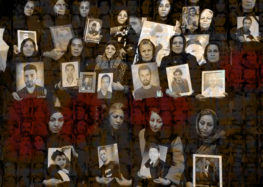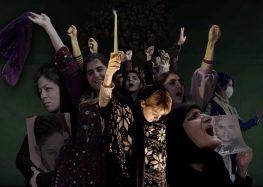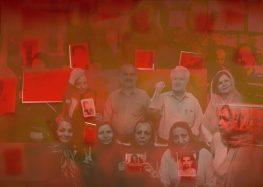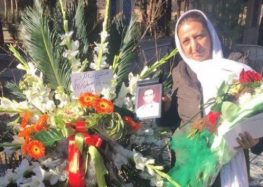Iranian Mother Sentenced to Prison for Demanding Justice For Slain Son
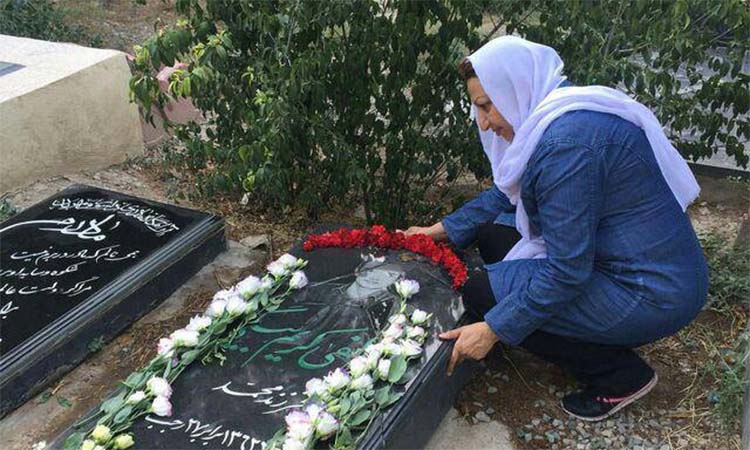
“Confessions” Obtained by Intelligence Ministry While Shahnaz Akmali Held in Solitary Confinement
A court in Tehran has sentenced Shahnaz Akmali, the mother of a well-known victim of the state crackdown on the protests against Iran’s 2009 presidential election, to one year in prison for her peaceful human rights activism.
Judge Mashallah Ahmadzadeh of Branch 26 of the Revolutionary Court also banned the 52-year-old from leaving the country, engaging in political activities, and accessing the internet for an undisclosed period of time, a legal source told the Center for Human Rights in Iran (CHRI) on October 26, 2017.
“Akmali has been convicted of ‘propaganda against the state’ for her activities as a member of the grieving Mothers of Laleh Park, her interviews with the media about her son and other victims of human rights abuses in Iran, as well as her assistance to the families of political prisoners,” the source, who requested anonymity, told CHRI.
The verdict, which will be appealed, was delivered to Akmali and her lawyer on October 25, 2017.
“The judge’s order states that the verdict against Akmali was based on the Intelligence Ministry’s report and her own confessions, making her defense in court irrelevant,” the source told CHRI.
“However, the Intelligence Ministry report was biased and full of lies and her confessions did not reveal any criminal activity either. For example, she said she posted things on the Telegram channel for the Mothers of Laleh Park and attended a protest rally in 2009, almost 10 years ago. First of all, these are not crimes. Second, these confessions were made under threats and pressure while she was held in solitary confinement without access to a lawyer or her family.”
The source continued: “The court banned Ms. Akmali from using cyberspace because after she was released on bail, she shared information about her case. But if her arrest and detention were conducted lawfully, why should the news worry the authorities?
“How can you ban someone from cyberspace? Does that mean she cannot use the Internet at all? That’s very strange; it’s impossible. That would mean she couldn’t even contact her relatives through the internet. This is against freedom of speech. It’s illegal and impossible.”
Akmali’s son, Mostafa Karim Beigi, died from a bullet wound to the head in Tehran during what came to be known as the “Ashura protests,” on December 27, 2009.
It remains unclear who shot Beigi, but the authorities initially concealed his location after he was killed, and subsequently refused to conduct an investigation into his murder.
Akmali’s many attempts to find her son’s killer through Iran’s judicial system have so far proven fruitless. She has participated in memorial events with the mothers of other victims of political repression in Iran to demand justice, and has supported the families of imprisoned activists.
In addition to Akmali’s group, the Mothers of Khavaran and Mothers of Peace have been pressuring the Iranian authorities for answers about loved ones who were killed by state forces or while in state custody.
Agents of the Intelligence Ministry arrested Akmali on January 25, 2017, and interrogated her in Evin Prison’s Ward 209 for three weeks without granting her access to a lawyer before releasing her on bail.
Akmali was summoned to the court on July 11, 2017, the same day Intelligence Minister Mahmoud Alavi told reporters it was “wrong” to arrest peaceful activists.
“I say this not as a cleric or academic, but as a security official, and the reason is that reporters and people engaged in cultural, economic and political activities are part of our society and it would be wrong to use intimidation and harsh methods against them,” he said.
A couple of months earlier, Alavi said that the ministry was not created to harrass citizens.
“The Intelligence Ministry is supposed to deal with elements that cause insecurity with practical actions and thoughtful solutions, not by rounding and bounding them up,” he said on March 14, 2017.
“When we are fighting the [foreign] enemy, we will use intimidation, but when we are dealing with our own people, we have to use ethical intelligence methods,” he added.

